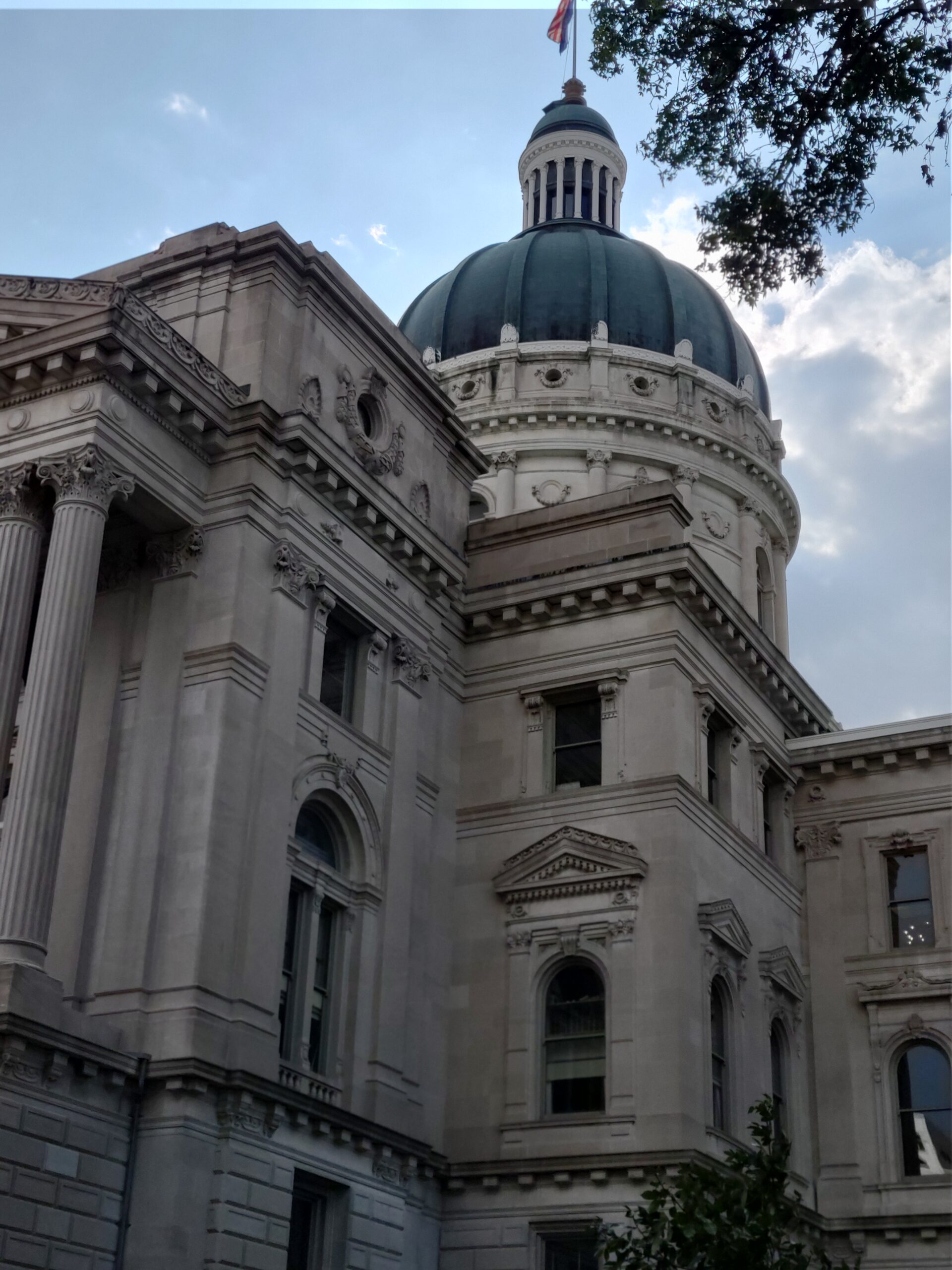
The Indiana Citizen
December 6, 2023
During Wednesday’s oral arguments in the religious freedom challenge to Indiana’s near-total abortion ban, the state’s attorney, James Barta, struggled to convince the Court of Appeals of Indiana that the state’s respect for religious exercise does not extend to abortion.
“Our nation’s long tradition of respect for religious exercise has never been understood to encompass a right to intentionally destroy unborn children any more than a right to commit assault or murder,” Barta, Indiana solicitor general, told the court. “There should be no doubt that the state has a compelling interest in protecting unborn children.”
However plaintiffs’ attorney, Ken Falk, legal director of the Indiana chapter of the American Civil Liberties Union, countered the state has exemptions in its abortion law that permits a pregnancy to be terminated in cases of rape, incest, danger to the mother’s physical health and lethal fetal anomaly. Moreover, the state accommodates the religious beliefs of inmates who must eat kosher meals and pharmacists who do not want to dispense certain drugs.
“This is hardly new territory,” Falk said. “I think the problem here is, simply, that the state is not recognizing that (Indiana’s Religious Freedom Restoration Act) imposes the highest burden upon it and it simply cannot meet this burden.”
In tbe case before the Court of Appeals – Indiana Members of the Medical Licensing Board of Indiana et al. v. Anonymous Plaintiffs 1 et al., 22A-PL-2938 and 23A-PL-1313 – the plaintiffs assert Indiana’s abortion law violates their rights under RFRA. They claim their sincerely held religious beliefs may direct them to terminate their pregnancies in circumstances not allowed under current Indiana law.
The Marion County Superior Court agreed and in December 2022, it issued a preliminary injunction prohibiting the state from enforcing the law and interfering with the ability of the plaintiffs, and others with the same religious beliefs, from obtaining abortions. The state appealed the ruling to the Indiana Supreme Court, but the justices refused transfer, so the case moved to the Court of Appeals.
At the appellate court, the panel of judges peppered Barta with questions about the exemptions in the abortion law, when life begins and the state’s compelling interest in the exercise of religion and fetal life.
“We’ve got RFRA, which is espousing the importance of religion to Hoosiers and yet we’re saying in … this very important life decision that you have in your life, … your religious beliefs don’t matter,” Judge Melissa May pressed.
When Barta responded the state is not favoring one religion over others but, rather, it has a compelling interest in limiting abortions, May pointed out the state’s limits on abortion have changed over time. Prior to the U.S. Supreme Court’s 1973 decision in Roe v. Wade, which gave women the right to an abortion, Indiana only allowed the procedure when the mother’s life was at risk.
Reciting the list of exemptions that are contained in the state’s abortion law, May asked, “Is not religion also something that could be in that exemption?”
Barta pushed back that RFRA “says someone can request an exemption from a generally applicable law, but not if there’s a compelling state interest.”
May countered, “So they have no religious rights. Because if the state’s compelling interest always trumps it, why do we have RFRA?”
Barta responded, “I think that is going to be the case in every case litigated under RFRA. Someone could always say, if they object religiously to paying taxes, ‘I don’t think the state should be able to compel that,’ but this court recognizes … there’s a compelling interest in requiring payment of taxes. So, in that circumstance, their rights will always give way to the state.”
This is the second challenge to the new abortion law and the second time the state has appealed a trial court’s ruling in favor of the plaintiffs.
In the first challenge – Planned Parenthood et al. v. Member of the Medical Licensing Board of Indiana, et al. – the plaintiffs argued Indiana’s new abortion law violated a woman’s right to liberty as guaranteed by the Indiana Constitution. A divided Indiana Supreme Court upheld the law, finding while the state constitution protects a woman’s right to an abortion when her health is at risk, the legislature still has the ability to restrict abortions.
After that ruling was issued in June, Planned Parenthood Great Northwest, Hawai’i, Alaska, Indiana, Kentucky, Inc., stopped performing abortions at its Indiana clinics.
In November, Planned Parenthood amended its complaint and is seeking to expand the exemptions, so women with mental health issues can receive an abortion.
The religious freedom case originates from a class-action lawsuit filed by a group of women and Hoosier Jews for Choice. Representing a variety of religious beliefs, including Judaism, Islam, Episcopalianism, Unitarian Universalism and Paganism, the women plaintiffs claim their sincere religious beliefs direct them to obtain an abortion under circumstances prohibited by the state’s abortion law, Senate Enrolled Act 1.
Before the Court of Appeals, Falk argued the plaintiffs’ religious exercise was being “substantially burdened” by the abortion restrictions. Even though none of the litigants are pregnant, he said, they are burdened by the law because they have changed their sexual practices and abandoned their plans to have more children.
“So I think there’s a substantial burden, so it’s right that the court says, ‘Let’s talk about the compelling interest’ and remember how high the standard is,” Falk said.
Judge Leanna Weismann picked up that argument and queried Falk about the state’s assertion that it has a compelling interest from the moment the egg is fertilized. Falk responded by noting the Indiana code has several definitions of a “human being.” The criminal code defines a human being as a person who was born and is alive while wrongful death statute allows for such a claim for a viable fetus.
Weissmannn then referred to the Indiana Supreme Court’s June ruling that upheld Indiana’s new abortion law. She pointed to the language used like “the life that abortion would end” and “prenatal life.”
“Do you think that the Supreme Court is telling us as a judicial finding that life begins at conception by the use of that language or do you think there’s something more to be gleaned from their choice of words,” Weissmann asked.
Falk demurred, saying it was difficult to infer such things from the June ruling. But he pointed to the Marion County Superior Court, which found that the question of when life begins is not a factual one but “a question of religion or philosophy.”
May said the difficulty of the case is that the women who have sincerely held religious beliefs that support abortion are not required to have an abortion.
Falk replied the women have sincere beliefs that they must be able to obtain abortions. He highlighted one plaintiff who wants to have another child but is choosing not to because one pregnancy ended in an abortion on account of a “very serious birth defect” and the other pregnancy was “truly horrendous.”
“She and her husband need to know that an abortion will be available because her religious belief compels her to obtain an abortion if, in fact, that’s necessary to preserve her health, whether that be physical or mental health,” Falk said.
Weissmann interjected, “So is family planning an exercise of religion?”
“It can be,” Falk responded. Then he pointed to the U.S. Supreme Court’s 2014 ruling that a privately-held corporation could not be forced to cover the costs of contraceptives. “Remember, in (Burwell v. Hobby Lobby Stores Inc.), the court found that paying health insurance was an exercise of religion.”
Dwight Adams, a freelance editor and writer based in Indianapolis, edited this article. He is a former content editor, copy editor and digital producer at The Indianapolis Star and IndyStar.com, and worked as a planner for other newspapers, including the Louisville Courier Journal.
10506
